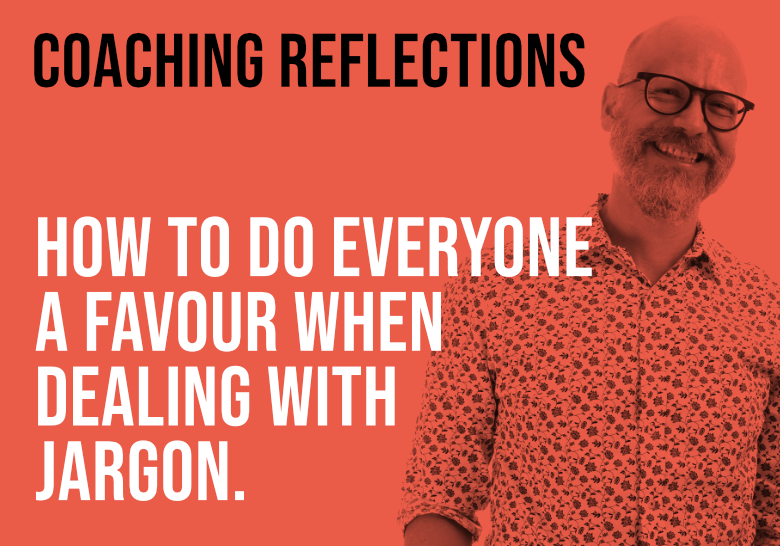This week’s coaching reflection is all about dealing with jargon and that feeling of having no idea what people are talking about in meeting (spoiler: nobody else knows either). There’s a simple trick you can use that everyone will thank you for.
You’ll find more of these on my YouTube channel.
Check out my coaching practice here.
Transcript
Intro
“I think we need to double click on this and develop a strategic vision roadmap and finalized DNA scenarios of resource deployment for experimentation.”
What?
If you’ve ever experienced someone say this kind of thing at work and wonder what the hell they’re talking about. There’s a simple trick you can use that everyone will thank you for.
My name is Andy Polaine and every week I spend my days coaching design leaders and in these videos are reflect upon the common themes and questions that come up in the week. And this week, I want to talk about combating jargon.
Jargon
Now I once worked for a large consultancy and I’ve also worked in academia. Both places are very full of jargon. So much so that I started collecting them over the years. I occasionally include them in my newsletter. I call it The Big Book of Guff and I have some corkers in there.
One of the common confessions of my coachees is they hear certain phrases, which it seems like everyone else on the call or the Slack channel understands, but they’re not really sure what it really means.
There’s things like a strategic roadmap. It’s often something with strategic something in front of it. And what you’ll find is people are often talking about this stuff and everyone else on the call goes, yeah, I think we should have one of those too. And does that thing where they are not really actually contributing anything new, they’re just agreeing with the person who went before and adding a little bit to it.
If you don’t understand, ask
When you really have no clue about what’s going on or you’re really not sure, and even better if you suspect the other person saying that stuff is also not sure, you can remember a thing that your parents might have told you at school. If you don’t understand something, ask because you can be sure that others don’t understand either and they’re too scared to ask.
A simple trick for cutting through jargon
My trick for cutting through or clarifying that kind of jargon is to ask something like, "You know, I’ve heard that phrase used by lots of different people in different ways. What do you mean by it? Just so that we’re aligned."
And you can ask them to make that tangible or give you an example. And you will probably find that people either don’t know and they’re just saying things like strategic vision without really knowing what they mean by it. Or they will know, and you’ll get your answer.
Either way, instead of looking stupid, everyone else is actually really thankful because I can guarantee you there’ll be other people thinking, I don’t know what we’re talking about either.
Do everyone a favour
I’ve had several times when coachees have said on a call, there’s been a back channel of direct messages on Slack or Teams with people asking, "Does anyone know, really know what we’re talking about?"
The world of work would be a much, much better place if more people had the courage to say, "I’m sorry, I don’t really understand what we’re discussing here."
It’s an opportunity to align
if you do discover that no one really knows what that term means or at the very least everyone’s got different opinions about that. Then that’s a really good place to be at, because then you can work through it and develop a shared understanding of the terms and what you mean, and specifically what’s the artifact or what’s the outcome that we’re after here and everyone’s on the same page.
Otherwise you can spend hours and hours in alignment meetings, circling around, trying to discover what the other person thinks and is that the same as what I think when actually you can just ask.
That’s what it means to do adulting in the workplace.
Outro
I hope that’s useful for you. You’ll find more of these on my YouTube channel and if you’d like to check out my coaching practice, it is at polaine.com/coaching and I’ll put the links below. If you’ve got in your own tips about how you go about cutting through jargon. Please post a comment below. I’d love to hear them.
Thanks very much. And I’ll see you again soon.


